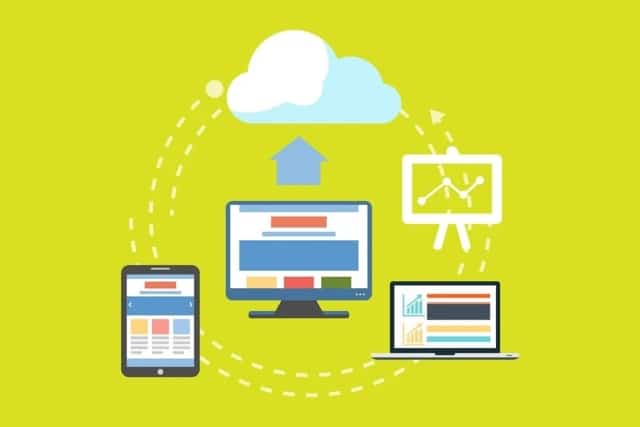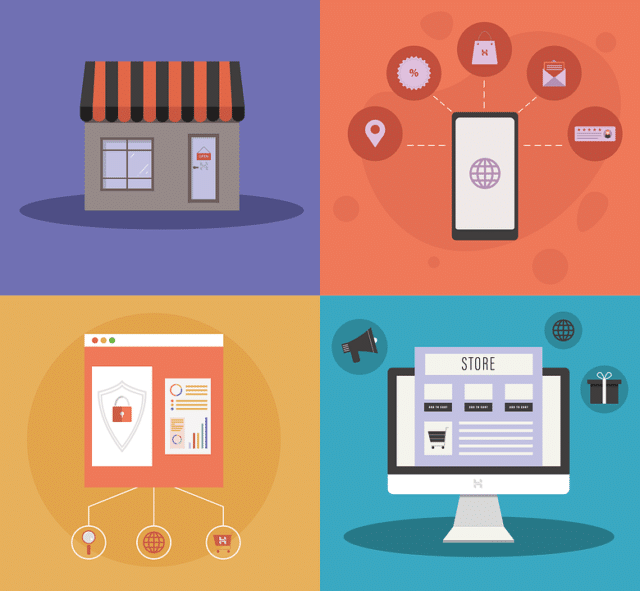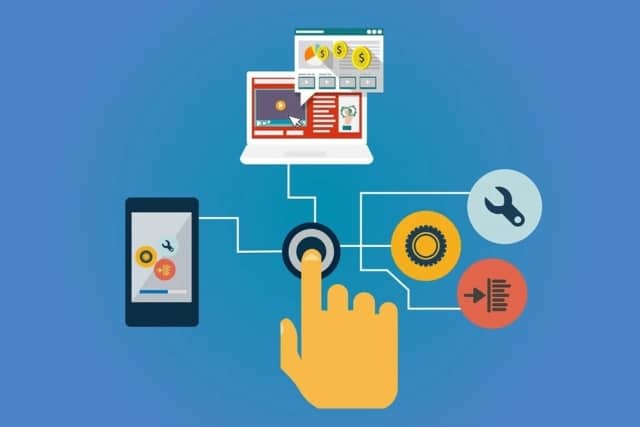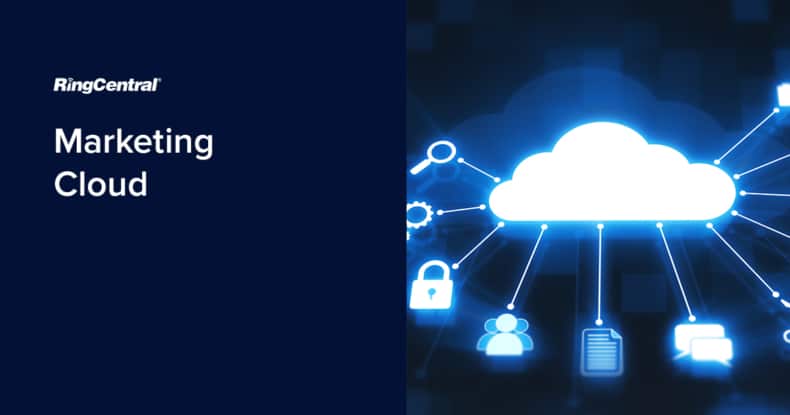In this article, we'll cover:
Marketing cloud is a term used by a number of vendors to refer to a suite of cloud-based marketing tools. Examples of marketing cloud suites include Salesforce Marketing Cloud (SFMC), Adobe Marketing Cloud, Oracle CX Marketing Cloud, and SAP Marketing Cloud.
These tools are used to manage marketing activities and campaigns across different channels, enabling businesses to target prospects and potential clients more effectively.
In this guide, we’ll introduce you to the marketing cloud and explain a little more about what it is, and what it does. We’ll start by providing a more detailed definition, before going on to discuss the differences between a marketing cloud and Pardot. Then we’ll discuss the uses of marketing clouds and some relevant examples, and explain how to set it up.
We’ll conclude by explaining how marketing cloud platforms can be integrated with RingCentral. Hopefully, by the time you’ve finished reading, you’ll have a much clearer idea of what a marketing cloud is and how it can help your business. Let’s get started.
What is a Marketing Cloud?
There’s been a lot of hype about the ongoing digital transformation that we’re seeing. Indeed, few aspects of our lives have been left completely untouched by the plethora of new technologies that have made such an extensive impact. This has entailed major changes in consumer habits, and tools like marketing clouds are enabling businesses to adapt to these.
First, though, it’ll help if we do a quick recap on customer relationship management (CRM), as it’s relevant to our discussion of marketing clouds.
What is CRM?
You’ve probably heard a lot about customer relationship management (CRM). It aims to foster long-term customer loyalties by streamlining processes. The objective is to enhance the customer experience and simplify the customer journey.
Choosing the right CRM software is key. CRM tools need to cover numerous bases: productivity, contact management, and sales management. CRM tools can help drive up standards of customer service – and this should translate into higher profitability and a healthier bottom line.
There are, however, differences between most CRM solutions and marketing clouds. In particular, ordinary CRM software is typically focused on customer relationships and boosting sales, whereas a marketing cloud – as the name implies – is more focused on the automation, streamlining, and monitoring of marketing functions.
Introducing marketing clouds
Marketing clouds incorporate a collection of marketing tools, all provided via the cloud, and all of which enable marketers to manage customer relationships and marketing campaigns more efficiently. As part of the wider trend towards marketing automation, marketing cloud platforms are designed to facilitate easier real-time monitoring, planning and decision-making.
As you might expect, a marketing cloud offers a comprehensive digital marketing platform covering a diverse array of capabilities and solutions. These include social media, content creation, web personalisation, data analysis, content management and advertising. The aim of a marketing cloud is to manage marketing activities more efficiently.
With marketing cloud, you can also use event-driven triggers to set specific responses to customer actions in motion. For example, should customers sign up for a loyalty scheme, marketing clouds can then send each one of them automatic thank-you messages via push notifications.
The overall aim of the marketing cloud is to empower marketers to create cohesive multichannel experiences, reaching customers via the appropriate channels – such as SMS, MMS, social media, and messaging (including group messaging) – at the appropriate times, thereby boosting both sales and revenue.
However, the term remains somewhat vague, and there are platforms and tools which together might be considered a kind of marketing cloud, but don’t use the label. This has led to some confusion and calls for a more concrete definition of marketing clouds.
Nevertheless, we can define a marketing cloud platform as one which can be used to optimise the whole customer journey from start to finish, rather than just certain areas of it. It must also encompass areas including content management, analytics, marketing automation, and acquisition.
We’ve already listed some of the leading marketing cloud solutions and their vendors. It’s worth noting here, though, that many clients mix and match tools from different providers, instead of signing up to the whole suite of marketing cloud solutions from one provider. This is partly because a lot of firms don’t wish to be reliant on a single solution and want to keep their options open, maintaining a degree of flexibility.
However, in the next section, we’ll introduce you to one of the more popular marketing cloud solutions on the market: Salesforce Marketing Cloud. As Salesforce was the first company to adopt ‘marketing cloud’ as a term, it makes sense to discuss their platform specifically.
Salesforce Marketing Cloud: A closer look
It’s worth looking at Salesforce Marketing Cloud as a case study of what marketing cloud in general has to offer. There are, as we’ve mentioned, plenty of alternatives available, and these generally provide comparable tools performing similar functions, though there are of course various differences between them.
Salesforce Marketing Cloud comes with tools including Journey Builder. This enables marketers to craft campaigns tailored according to a range of factors including customer demographics, needs, and communication channel habits. It is also connected to Salesforce’s Sales Cloud and Service Cloud.

Other tools include Social Studio, Mobile Studio, Advertising Studio, Data Studio, Interaction Studio, Email Studio, and Salesforce DMP. These are sometimes referred to as ‘sub-clouds’. Marketing Cloud is also integrated into the broader Salesforce ecosystem.
In addition, Salesforce Marketing Cloud makes use of artificial intelligence and machine learning to help businesses tailor each customer interaction to the needs of the individual consumer. Einstein, Salesforce’s AI-based tool for Marketing Cloud, analyses customer behaviour and language to deliver more personalised content to customers.
You can also use Salesforce Marketing Cloud’s Email Studio, Mobile Studio, and Social Studio to boost customer engagement, crafting the right message for individuals across email, SMS, and social media, and thereby increasing sales and revenue.
Salesforce Marketing Cloud has also been singled out for praise by market research firms including Forrester and Gartner, the latter of which named the company as a leader in its 2020 Magic Quadrant for multichannel marketing hubs.
Pardot vs. marketing cloud: What’s the difference?
There’s a lot of overlap between marketing cloud solutions and Salesforce Pardot, another digital analytics and automation platform. For relative novices and newcomers, it can be difficult at first to tell the two apart. Despite their similarities, there are also important differences between them, which we’ll discuss in more detail in this section of our guide.
Pardot, like a marketing cloud, enables businesses to measure and monitor how effective or otherwise their communications are. Again, as with marketing cloud platforms, Pardot provides detailed insights on user behaviour and, based on various criteria, develops personalised content with a view to ultimately driving improved sales and revenue.
So far, you might be even more confused about the difference between the two platforms. There are substantial differences that are important to note. In particular, Pardot is primarily a B2B platform, whereas marketing cloud tools are – generally speaking – targeted at clients in the B2C sector.

Pardot is also focused on email marketing first and foremost, while marketing cloud offers a broader range of functions and communications channels, some of which we listed earlier. The latter platform is geared towards lifecycle management and omnichannel customer journey communications across the board, rather than just email.
Crucially, the two platforms are targeted at different buying cycles. Marketing cloud platforms are better suited to firms with larger customer databases and smaller sales revenues. The inverse is the case with Pardot, which works better for businesses with smaller databases and larger sales revenues.
Another difference between Pardot and a marketing cloud is pricing. Pardot’s licence price is lower, which is one reason why some firms choose it. However, this can be a false economy, as marketing cloud tools offer integration and customisation options which can help firms save money in the long run.
Uses of a marketing cloud
Marketing Cloud has numerous potential uses. It allows users to structure customer journeys across multiple channels – among them social media, push notifications, mobile apps, SMS, and email – and touchpoints. This means that businesses can send automated messages to users depending on the actions they take, tracking their progress at each stage.
This way, firms can provide users with gentle encouragement to complete transactions and track how they interact with the brand. In addition, a marketing cloud allows users to automate processes including segmentation, file uploads, and data extraction, thus helping to facilitate smoother and more efficient workflow.
Because a marketing cloud gathers such detailed data, businesses can gain in-depth insights into customer behaviour. This data can be translated into easily understandable real-time statistics and reports. This makes it much easier to determine the impact of marketing campaigns, social media activities, and so on.

Major benefits
There are various potential benefits of a marketing cloud. Obviously, the ultimate end goal is to understand customer behaviour better and foster closer connections with consumers, so that they buy more and generate additional revenues. We’ve noted the importance of turning first-time customers into regular customers; a marketing cloud is designed to help you do this.
Fostering these enduring connections between brands and customers requires the former to develop a detailed, intimate knowledge of the latter. As well as appreciating what it is they’re looking for, not just in terms of products and services, but more generally with regard to the customer experience.
A marketing cloud helps businesses achieve this. It enables them to link up data from various devices, sources, and channels – including the ability to capture and activate data from third parties. This provides brands with a more detailed and rounded picture of the customer, their needs, and aspirations.
All of that puts these businesses in a better position to reach customers and to encourage them to proceed along their particular customer journey.

Moreover, a marketing cloud allows for a genuine two-way engagement between businesses and their customers. It helps to maintain the attention of the customer and keep them engaged with their journey, while the customer’s own actions provide the business in question with unique insights. This allows businesses to get to know their customers better, and serve them more effectively.
Marketing cloud platforms – including Salesforce, SAP, and Adobe – also make use of artificial intelligence and machine learning. In practice, this means that marketing cloud data is used in combination with AI to plan and organise customer interactions more efficiently.
This means that the platform can engage in a customised dialogue with individual consumers, drawing on the information it has about their past interactions.
With a marketing cloud, businesses can use channels and messaging more effectively to reach customers, as well as building stronger and longer-lasting relationships with them. They can create cross-channel campaigns via smoother messaging flows and pre-built templates. All the while ensuring that consumers also benefit from a coherent customer experience tailored to their preferences.
Examples of marketing cloud platforms
Examples of widely-used marketing cloud platforms include:
- Adobe Marketing Cloud
- Oracle CX Marketing Cloud
- AgilOne Predictive Marketing Cloud
- Salesforce Marketing Cloud (SFMC)
- SAP Marketing Cloud
- Nielsen Marketing Cloud
Each of these platforms has its own individual features. If you’re thinking of adopting one for your own business, ensure you carry out thorough research to determine the best option.

How to set up a marketing cloud
If you’re new to marketing clouds and are planning to adopt one, you might be wondering how to go about configuring it. Certainly, this can be a challenge for newcomers. The good news is that once you’ve got the hang of it, itt is relatively straightforward to use, and you’ll have powerful tools at your disposal.
To get started, you’ll need to configure your marketing cloud account. In SFMC, there are a couple of ways you can do this. Firstly, you can do it by clicking on ‘setup’ – you should find it in the drop-down menu in the right-hand corner (where your name is displayed). You can use this to configure key functionality for your account.
Once you click on ‘setup’, you should then be presented with the ‘create new user’ tab. You can use this, as the name indicates, to create new users and add them to the system. Simply fill in the name, username and email address of the person for whom you want to create an account, and the process should be self-explanatory from there.
For more detailed guidance on how to configure your marketing cloud setup, you should get in touch with your chosen or potential provider. They should then provide you with more information.

Integrating your marketing cloud platform with RingCentral
RingCentral makes it easy to streamline your business operations by integrating with apps from hundreds of other companies. With RingCentral, there’s no longer any need to go through the hassle of app switching, as apps from over 200 firms are brought together in the same place; making RingCentral the largest ecosystem of integrated apps of its kind.
You can integrate RingCentral with services from Salesforce, Microsoft, Google and many others. This enables you to provide smoother and more efficient customer support, ensure security through Single Sign-On, automate your sales cycle, and enjoy the benefits of advanced business communication functions.
Integrating RingCentral with Salesforce is easy and it means that your business can use both RingCentral and your marketing cloud in tandem, allowing you to automate tasks, make workflows more efficient, and deliver better all-round customer service and marketing campaigns.
With RingCentral for Salesforce, you can create a more collaborative CRM experience. Better still, RingCentral for Salesforce offers seamless integration with RingCentral Video, meaning you can schedule and start RingCentral Video meetings from Salesforce Global Actions, as well as viewing them in your Salesforce calendar and configuring your meeting settings within Salesforce.
RingCentral’s App Gallery provides a diverse choice of integrations to help simplify communications and enhance productivity – and, ultimately, it’s your customers who will be the main beneficiaries.
Originally published Apr 07, 2021, updated May 15, 2021

